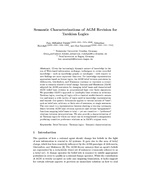Semantic Characterizations of AGM Revision for Tarskian Logics
From International Center for Computational Logic
Semantic Characterizations of AGM Revision for Tarskian Logics
Faiq Miftakhul FalakhFaiq Miftakhul Falakh, Sebastian RudolphSebastian Rudolph, Kai SauerwaldKai Sauerwald
Faiq Miftakhul Falakh, Sebastian Rudolph, Kai Sauerwald
Semantic Characterizations of AGM Revision for Tarskian Logics
In Guido Governatori, Anni-Yasmin Turhan, eds., Proceedings of the 6th International Joint Conference on Rules and Reasoning (RuleML+RR 2022), volume 13752 of LNCS, 95-110, September 2022. Springer
Semantic Characterizations of AGM Revision for Tarskian Logics
In Guido Governatori, Anni-Yasmin Turhan, eds., Proceedings of the 6th International Joint Conference on Rules and Reasoning (RuleML+RR 2022), volume 13752 of LNCS, 95-110, September 2022. Springer
- KurzfassungAbstract
Given the increasingly dynamic nature of knowledge in the era of Web-based information exchange, techniques to revise recorded knowledge – such as knowledge graphs or ontologies – with respect to new findings are more important than ever. For knowledge representation approaches based on formal logics, the AGM belief revision postulates by Alchourrón, Gärdenfors, and Makinson continue to represent a cornerstone in research related to belief change. Katsuno and Mendelzon (K&M) adopted the AGM postulates for changing belief bases and characterized AGM belief base revision in propositional logic over finite signatures.We generalize K&M's approach to (multiple) base revision in arbitrary Tarskian logics, covering all logics with a classical model-theoretic semantics and hence a wide variety of logics used in knowledge representation and beyond. Our generic formulation applies to various notions of “base”; such as belief sets, arbitrary or finite sets of sentences, or single sentences.
The core result is a representation theorem showing a two-way correspondence between AGM base revision operators and certain “assignments”: functions mapping belief bases to total — yet not transitive — “preference” relations between interpretations. We also provide a characterization of all Tarskian logics for which our result can be strengthened to assignments producing transitive preference relations as in K&M’s original work. - Bemerkung: Note: This publication has received the Best Student Paper Award!
- Projekt:Project: DeciGUT, ScaDS.AI
- Forschungsgruppe:Research Group: Computational LogicComputational Logic
@inproceedings{FRS2022,
author = {Faiq Miftakhul Falakh and Sebastian Rudolph and Kai Sauerwald},
title = {Semantic Characterizations of {AGM} Revision for Tarskian Logics},
editor = {Guido Governatori and Anni-Yasmin Turhan},
booktitle = {Proceedings of the 6th International Joint Conference on Rules
and Reasoning (RuleML+RR 2022)},
series = {LNCS},
volume = {13752},
publisher = {Springer},
year = {2022},
month = {September},
pages = {95-110},
doi = {10.1007/978-3-031-21541-4_7}
}

